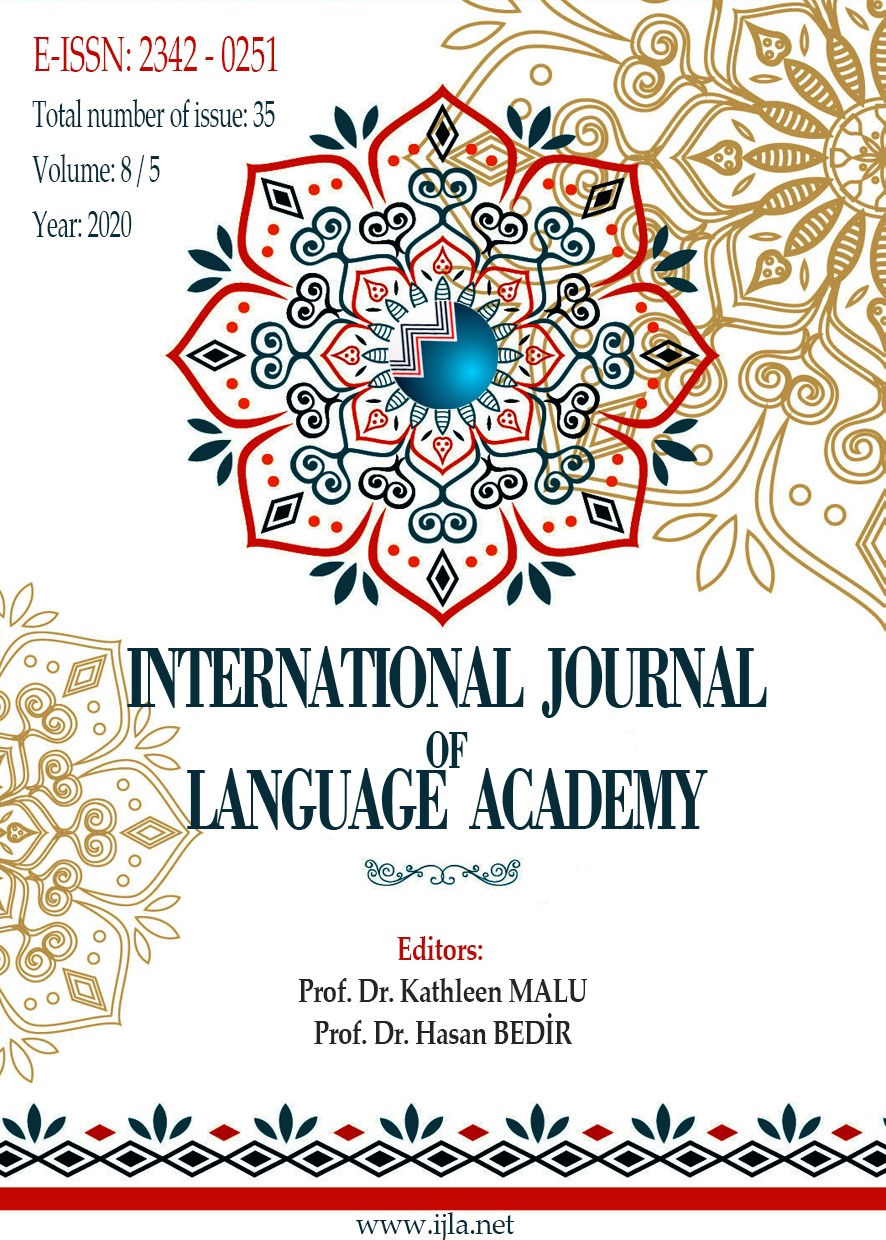Author :
Abstract
Bilişsel Dilbilim ve Bilişsel Psikoloji alanları tarafından yürütülen ortak çalışmaların yansımalarından biri olarak ortaya çıkan Bilişsel Şiirbilim çalışmalarında, yazınsal metinler bilişsel bakış açısıyla incelenmektedir. Alanın öncüsü Tsur (2002), duygu içerikli yazınsal metinlerden olan şiirlerin okuyucuların zihinsel, bilişsel ve duygusal tepkileri temelinde çözümlenmesi gerektiğini, şair ve okuyucu yorumlarının örtüşmesi oranında şairin/şiirin başarılı olarak değerlendirilebileceğini savunmaktadır. “Şiirsel yeterlilik” olarak adlandırdığı bu kavramdan yola çıkılarak yapılan bu çalışmada i) şairin okuyucularına aktarmak istediği duygu ve anlamların okuyucuya ulaşmasında başarılı olup olmadığının ve (ii) okuyucu üzerinde şiir yapılarının şairin düşünceleriyle ne oranda örtüştüğünün saptanması hedeflenmiş, bu yolla söz konusu kavramın geçerliliğinin sınanması amaçlanmıştır. Bu amaç doğrultusunda 2009- 2019 yılları arasında yayımlanan 52 şiiri kitabındaki 3081 adet şiir içinden rassal yöntemle “Eve Gidip Uyuyacağım” (şair: Gülçin Sahilli, 2015) adlı şiir veritabanı olarak seçilmiştir. Bireye özgü idealleştirilmiş bilişsel modeller aracılığıyla şairle aynı/benzer özelliklere sahip 43 okuyucudan şiire dayalı yorumlara Hall ve Van De Castle Ölçeği’nin sunduğu ölçekbirimler çerçevesinde ulaşılmış, bu yorumlar şair yorumlarıyla karşılaştırılmış, tikel ve tümel örtüşme koşuluna göre elde edilen sonuçlar tartışılmıştır. Buna göre Tsur’un “şiirsel yeterlilik” olarak tanımladığı şairin/şiirin okuyucularına aktarmak istediği duygu ve anlamların okuyucuya ulaşmakta tikel değerlendirme koşulunda başarılı (f=%66.3-P=0.66); tümel değerlendirme koşulunda ise başarısız (f=25.3-P=0.25) olduğu sonucuna ulaşılmış, söz konusu kavramın geçerliliğinin, okuyuculardan elde edilen verilerin değerlendirilme biçimine göre değişiklik gösterdiği bulgulanmıştır.
Keywords
Abstract
In Cognitive Poetics studies, emerging as one of the reflections of the joint studies conducted by Cognitive Linguistics and Cognitive Psychology, literary texts have been analyzed form a cognitive perspective. As the pioneer of the field, Tsur (2002) argues that since poems are the literary texts having emotions, they must be analyzed on the basis of readers’ mental, cognitive and emotional responses and they can be considered as “competent” in view of the rate of correspondance of the poet’s and the readers’ interpretations. Based on the concept which is called as “poetic competence”, this study aims to detect i) whether the poetic structures are competent to convey the emotions and meanings to the reader and ii) to what extent do the poet’s interpretations correspond to the readers’. In this way, it is aimed to test the validity of the concept. In accordance with this aim, the poem named “Eve Gidip Uyuyacağım” has been chosen as the database with random method from 3081 poems in 52 poetry books published between 2009-2019.By means of Idealized cognitive models, poerty-based interpretations from the readers with the same/similar characteristics as the poet are reached within the framework of the scale units offered by Hall ve Van De Castle; these interpretations are compared with the interpretations of the poet and the results obtained in condition of partial and complete correspondence have been discussed. Accordingly, the concept “poetic competence” stated by Tsur, which refers being competent in conveying the emotions and meanings to the reader, is valid in view of partial evaluation (f=%66.3-P=0.66) whereas it is not in a condition of complete evaluation (f=25.3-P=0.25). Thus, the result shows that the validity of the concept in question may vary according to the way of evaluation of the data obtained from the readers.
Keywords
- Barthes, R. (1967). The death of the author: image music text. (S, Heath, Çev.) London: Fontana Press.
- Büyükkantarcıoğlu, S. N. (2016). Metinden zihinlere yolculuk: bilişsel dilbilim ve bilimsel şiirbilim bağlamında deneysel bir çalışma. S. Büyükkantarcıoğlu, I. Özyıldırım ve E. Yarar (Ed.), Prof. Dr. Ahmet Kocaman'a armağan: dilbilime adanmış bir yaşam (ss.111-128). Ankara: Hacettepe Üniversitesi Yayınları.
- Domhoff, G.W. (1996). Finding meanings in dreams. New York: Plenum Press.
- Harrison, C. ve Stockwell,P. (2014). Cognitive poetics. J. R. Taylor ve J. Littlemore (Ed.), The Bloomsbury companion to cognitive linguistic (ss.218-233). New York: Bloomsbury Publishing
- Lilja, E. (2014 Reuven Tsur poetic rhythm. Structure and performance. An empirical study in cognitive poetics. Brighton, Sussex Academic Press, 2012 (A review article). Studia Metrica et Poetica, 1(1), 142-148.
- William, J. M. (2012). Cognitive poetics and common ground in a multicultural context: the poetry of Zehra Çitak. The German Quarterly, 85(2), 173-192.
- Sahilli, G. (2015). Gül Kedisi. İstanbul: Yasak Meyve Yayınları.
- Scheaffer, R. L., Mendenhall III, W., Ott, R. L. ve Gerow, K. G. (2011). Elementary survey sampling: cengage learning. Boston: Brooks/Cole.
- Stockwell, P. (2009). The cognitive poetics of literary resonance. Language and cognition, 1(1), 25-44.
- Tenbrink, T. (2015). Cognitive discourse analysis: accessing cognitive representations and processes through language data. Language and cognition, 7(1), 98-137.
- Tsur, R. (1992). Toward a theory of cognitive poetics. Amsterdam: Elsevier Science Publishers.
- Tsur, R. (2002). Aspects of cognitive poetics. E. Semino ve J. Culpeper (Ed.), Cognitive stylistics: language and cognition in text analysis (ss.279-318). Amsterdam: John Benjamins.
- Tsur, R. (2006). ‘Kubla Khan’ poetic structure, hypnotic quality and cognitive style: a study in mental, vocal and critical performance. Amsterdam: John Benjamins.





